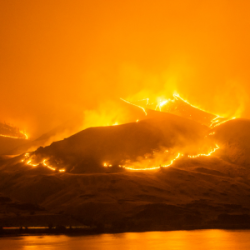
As we continue considering what rewriting the sermon on the mount might look like for us today, Gehenna, the valley of the son of Hinnom, was a literal place in the history of the Jews:
“Then the boundary goes up by the valley of the son of Hinnom (Gehenna) at the southern slope of the Jebusites (that is, Jerusalem); and the boundary goes up to the top of the mountain that lies over against the valley of the son of Hinnom, on the west, at the northern end of the valley of Rephaim.” (Joshua 15:8)
Welcome Readers! Please subscribe to Social Jesus Here.
(Read this series from its beginning here.)
This place became home to Judah’s terrible history of participating in child sacrifice:
“And [Ahaz, King of Judah] made offerings in the valley of the son of Hinnom, and made his sons pass through fire, according to the abominable practices of the nations whom the LORD drove out before the people of Israel.” (2 Chronicles 28:3)
“He made his son pass through fire in the valley of the son of Hinnom, practiced soothsaying and augury and sorcery, and dealt with mediums and with wizards. He did much evil in the sight of the LORD, provoking him to anger.” (2 Chronicles 33:6)
Gehenna was the cultic location where children were offered to the god Molech. At some point it also came to be referred to as Topheth, a word thought to signify the hearth where a child was placed. The Hebrew term has parallels in both Ugaritic and Aramaic that mean “furnace, fireplace.” Scholars believe that Topheth was at the edge of the valley of the son of Hinnom, southwest of Jerusalem. An 8th Century BC Phoenician inscription describes sacrifices that ancient peoples made to Molech before battle.
But the history of the place does not end there.
It next resurfaces with the prophet Jeremiah:
“And they go on building the high place of Topheth, which is in the valley of the son of Hinnom, to burn their sons and their daughters in the fire—which I did not command, nor did it come into my mind. Therefore, the days are surely coming, says the LORD, when it will no more be called Topheth, or the valley of the son of Hinnom, but the valley of Slaughter: for they will bury in Topheth until there is no more room.” (Jeremiah 7:31–32)
Jeremiah is saying to his people that Babylon is coming, and will bring such devastation on Jerusalem that the valley of the son of Hinnom (Gehenna) will become a burying place that will overflow with corpses, and not those of sacrificed children but corpses of adults who, according to Jeremiah, followed after the kinds of gods that required such nightmarish atrocities.
At this stage, notice that Jeremiah is warning not of a postmortem experience, but of a distinctly this-life, this-world experience that could rightly be termed “hell” but that points to the literal destruction of their nation by a Gentile kingdom—Babylon.
“And go out to the valley of the son of Hinnom at the entry of the Potsherd Gate, and proclaim there the words that I tell you. You shall say: Hear the word of the LORD, O kings of Judah and inhabitants of Jerusalem. Thus says the LORD of hosts, the God of Israel: I am going to bring such disaster upon this place that the ears of everyone who hears of it will tingle. Because the people have forsaken me, and have profaned this place by making offerings in it to other gods whom neither they nor their ancestors nor the kings of Judah have known; and because they have filled this place with the blood of the innocent, and gone on building the high places of Baal to burn their children in the fire as burnt offerings to Baal, which I did not command or decree, nor did it enter my mind. Therefore the days are surely coming, says the LORD, when this place shall no more be called Topheth, or the valley of the son of Hinnom, but the valley of slaughter.” (Jeremiah 19:2–6)
For Jeremiah, Gehenna had an end. It was not the equivalent of being eternally forsaken by God. Gehenna, in Jeremiah’s thinking, was temporary and held a restorative hope rather than a retributive one. This is very different than many of the Christian versions of “hell.”
Again, all of this reveals the concerns and struggles of the Jesus community at this time. We’ll take a look at how this applies to us, today, next.
(Read Part 3)













